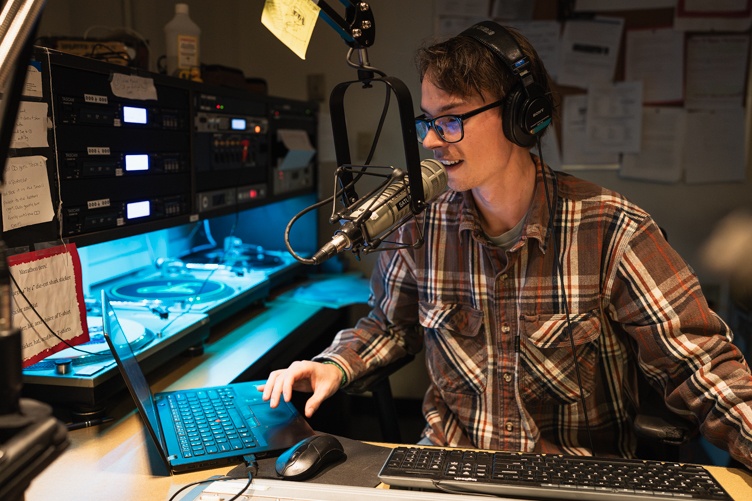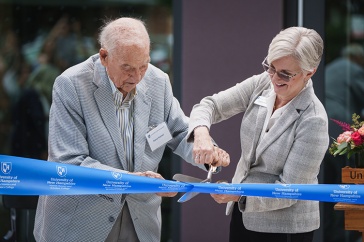
Keith Sangillo ’27 mans the DJ booth in the WUNH studio.
As the clock ticked toward 3 a.m., Mallory Schumann ’26 was rummaging around the WUNH radio station office, rifling through media to find the next tracks she wanted to play and embracing the “quiet and calm” that filled the studio at that sleepy hour.
And then the phone rang.
It turned out to be a welcome interruption, a would-be donor interested in giving to WUNH’s signature annual fundraiser, the sole reason Schumann was at that moment searching for songs rather than counting sheep.

Marathon Week at WUNH is underway! Give now to support the student-run radio station at UNH, which has been operating for more than 60 years. Marathon Week is WUNH's signature annual fundraising event, featuring a live DJ on air 24 hours each day throughout the week. Listeners and supporters can donate any amount, and earn swag including:
- $9.13 – Shark sticker
- $30 - Hat and shark sticker
- $60 - Hat, shark sticker, and choice of shirt
- $91.30 - Hat, shark sticker, and two shirts
Don’t miss your chance to be part of this memorable week and to help keep the station thriving. Give any amount now!
For one week every fall, WUNH – UNH’s student-run radio station broadcasting at 91.3 FM – hosts a fundraising marathon, putting live DJs on the air 24 hours a day for seven consecutive days. The event is among the most anticipated of the year at the station and has turned into an energizing, team-building experience for the student DJs and an opportunity for inspired listeners and supporters to give at all hours of the day and night –occasionally including 3 a.m.
“It’s nice to be a part of something like this, one of those things that’s not very common in radio these days. There’s something really cool about answering the phones when it gets busy, it feels very hustle-bustle,” says Schumann, the station’s fundraising coordinator, who fielded the early-morning call during her first marathon shift as a student DJ. “It’s great to know that after so many years we still have people that are so interested and involved in our station, that as public radio has become less and less popular with the rise of streaming apps and podcasts, people not only still tune in to us but also support our mission year after year.”
The response to the marathon each year certainly bears that sentiment out. WUNH typically raises anywhere from $6,500 to $7,000 during the week, according to Jack McDonough ’26 , the station’s general manager, the largest sum that comes in during any one stretch of time throughout the year.
This year’s marathon is underway and runs through Saturday, Nov. 15.
But the event is memorable for reasons beyond the bottom line. It’s an annual opportunity to break from the monotony of the traditional schedule, and having so many DJs flowing through the office and spending time with each other creates connection that is hard to match during normal operating hours.
“It’s kind of a bonding thing for us,” says McDonough. “With radio, it can be kind of hard to create that sense of community – being a DJ is a very solitary thing. But this gives everyone a chance to work together.”
The marathon has been taking place for about 40 years, though pinning down a definitive start date is challenging. According to Bruce Pingree, a student DJ in the 1970s, the tradition began “sometime in the 80s.”
Pingree said WUNH had shifted to high power (1750 watts) in the spring of 1972 and became one of the early stations to go to FM stereo in the summer of 1973, and the marathon was started because “we knew at some point we would need to upgrade the transmitter, so we started the fundraiser and set aside that money for future work.”
In the early days of the marathon, Pingree says, four DJs would each sign up for a six-hour shift per day, manning phones and playing music. That eventually gave way to a schedule featuring shorter shifts, with DJs fundraising in their usual time slots while additional participants manned the phones.
The current schedule calls for student DJs to host a show in their normal timeslot and also to take on at least one additional show. Though the late-night hours are the hardest to fill, the schedule does eventually round out, McDonough says. WUNH has a roster of about 65 student DJs and about 20 non-student DJs, he says. There is also an executive board of about 16 students, including Schumann and McDonough.
During non-marathon weeks, the on-air schedule fluctuates between about 60% to 100% full depending on the day, with the non-manned hours featuring shows played from the station’s archival system.
The marathon is something of a callback to the station’s heyday, as there was a time when the 24/7 schedule was the norm. In his time as a student DJ, Garry Haworth recalls every slot being filled as part of the standard routine.
“You’d put on In-A-Gadda-Da-Vida and have time to run upstairs to get a coffee and a donut and come back down while it was still on,” Haworth quips.
Haworth spent more than three years as the station’s music director between 1972 and 1976 and looks back at those memories as among the fondest from his time at UNH. Though he never spent a day in radio as a professional – he used his UNH degree to forge a career in environmental science that lasted more than 30 years – he recalls the same camaraderie and uplifting atmosphere that current students still describe.
“When I talk to students I say, ‘You have to have an outlet. You can work your tail off, study like the bejeebers, but you need an outlet.’ And the radio station was my outlet,” Haworth says. “I did the environmental education stuff because I knew I’d be able to eat, but I did radio because music has been my background since I was about 8 years old.”
Haworth credits his father, an amateur radio enthusiast, for sparking his musical interests, and points to Boston DJs of his youth as inspiration when he arrived to work at WUNH. He was there during the switchover to increased power and recalls the station reaching from Falmouth, Maine to Miami, Florida, because the “signal would just bounce down the coast.”
With the advent of streaming, that reach has certainly expanded, and the marathon is the station’s annual opportunity to capitalize on that expansion and connect with enthusiastic supporters. The student DJs look forward to the spirit the marathon brings, livening up the studio space for a full week.
“From my perspective, most of the semester is just kind of week-to-week, get your work done, but this is our biggest week at the station,” McDonough says. “Everyone gets excited about it and there’s a sense of anticipation and fun around the station.”
Adds Schumann: “It’s really great to see that so many people care about what we do, and to be part of something that’s developed such a real tradition.”
-
Written By:
Keith Testa | UNH Marketing | keith.testa@unh.edu
















































